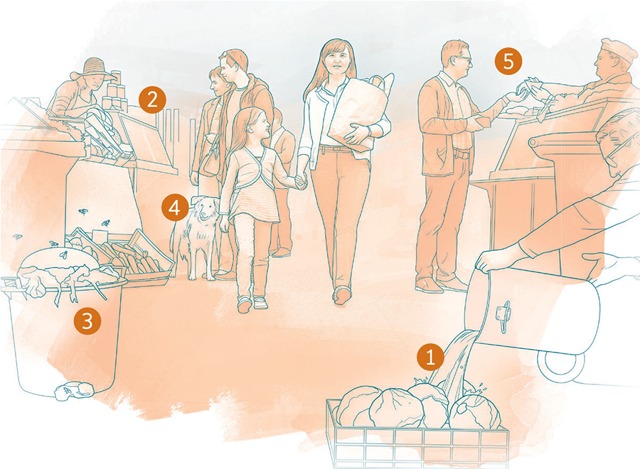Many ancient cities were protected by massive walls. If an enemy breached just a small section of a wall, the safety of the entire city was at risk. Your body is like a walled city. How you care for your defenses has much to do with how healthy you are. Consider five elements that can expose you to disease and how you can put up the best possible defenses.
1 WATER
THE THREAT: Harmful organisms can “march” straight into your body by way of contaminated water.
YOUR DEFENSE: The best defense is to protect your water supply from contamination. If you know that your water supply is contaminated or suspect that it is, you can treat the water at home to make it safe.
*Store potable water in a closed vessel, and dispense it hygienically with a clean ladle or through a tap. Never put your hands into a clean water supply. If possible, you should try to live in a community that properly disposes of human waste so that it does not contaminate local water sources.
2 FOOD
THE THREAT: Harmful organisms can be present in or on your food.
YOUR DEFENSE: Contaminated food may look fresh and nutritious. So get into the habit of thoroughly washing all fruits and vegetables. Ensure that food utensils, kitchen surfaces, and your hands are clean when preparing or serving food. Some foods require cooking at a certain temperature in order to destroy dangerous microbes. Beware of food that is discolored or has an unpleasant odor or taste—signs that an army of microorganisms could be waiting for you. Refrigerate unused food as soon as possible. Avoid preparing food for others when you are sick.
3 INSECTS
THE THREAT: Some insects can infect you with the harmful microorganisms that live inside them.
YOUR DEFENSE: Limit contact with disease-carrying insects by staying indoors when they are active or by wearing protective clothing, such as long sleeves and long trousers. Sleep under treated insect nets, and use personal insect repellent. Eliminate containers of stagnant water where mosquitoes could breed.
4 ANIMALS
THE THREAT: Microbes that live harmlessly inside an animal can threaten your health. If you are bitten or scratched by a pet or another animal or exposed to its feces, you could be at risk.
YOUR DEFENSE: Some people choose to keep their animals outside the house to minimize contact with them. Wash your hands after touching a domestic animal, and avoid all contact with wild animals. If you are bitten or scratched, wash the wound thoroughly and seek a doctor’s advice.
5 PEOPLE
THE THREAT: Some germs can invade your body by riding on tiny droplets in someone’s cough or sneeze. They can also spread through skin contact, such as hugging or shaking hands. Microorganisms from other people may lurk on such items as doorknobs, handrails, telephones, remote controls, or computer screens and keyboards.
YOUR DEFENSE: Do not share personal items, such as razors, toothbrushes, or towels. Avoid contact with body fluids from animals or from other people, including blood and products derived from blood. And do not underestimate the benefits of washing your hands thoroughly and frequently. It is perhaps the most effective way you can stop the spread of infection.
If possible, stay home when you are sick. It recommended that you cough or sneeze into a tissue or your sleeve, but not into your hands.
